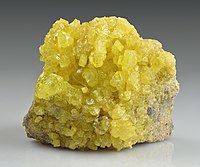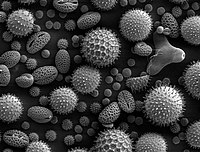
Impact of prolonged rice cultivation on coupling relationship among C, Fe, and Fe-reducing bacteria over a 1000-year paddy soil chronosequence
Sign Up to like & getrecommendations! Published in 2019 at "Biology and Fertility of Soils"
DOI: 10.1007/s00374-019-01370-x
Abstract: Long-term soil chronosequences are valuable model systems for investigating pedogenesis and investigating the process of element coupling. Here, we assessed the coupling relationships among C, Fe, and Fe-reducing bacteria (Anaeromyxobacter, Geobacter, and Shewanella) in a… read more here.
Keywords: among reducing; chronosequence; rice cultivation; soil ... See more keywords

Corrosion of 907 Steel Influenced by Sulfate-Reducing Bacteria
Sign Up to like & getrecommendations! Published in 2019 at "Journal of Materials Engineering and Performance"
DOI: 10.1007/s11665-019-03927-1
Abstract: The effect of sulfate-reducing bacteria (SRB) on the corrosion of 907 steel was investigated. Results demonstrated that the chemical composition of corrosion products, the corrosion rate, and corrosion type were altered due to the adherence… read more here.
Keywords: corrosion 907; 907 steel; sulfate reducing; corrosion ... See more keywords

Newly imine-azo dicationic amphiphilic for corrosion and sulfate-reducing bacteria inhibition in petroleum processes: Laboratory and theoretical studies
Sign Up to like & getrecommendations! Published in 2022 at "Applied Surface Science"
DOI: 10.1016/j.apsusc.2021.151531
Abstract: Abstract Oil and gas process faces a large dilemma during the acidizing job. So, dicationic surfactant namely; 1-dodecyl-3-((E)-(4-(((E)-(1-dodecylpyridin-1-ium-4-yl) methylene)amino)-2-hydroxyphenyl) diazenyl)pyridin-1-iumdibromide (SDCAC) was synthesized. Spectroscopic and CHN elemental analysis studies confirmed the SDCAC structure. SDCAC has… read more here.
Keywords: sdcac; newly imine; sulfate reducing; corrosion ... See more keywords

The role of arsenate reducing bacteria for their prospective application in arsenic contaminated groundwater aquifer system
Sign Up to like & getrecommendations! Published in 2019 at "Biocatalysis and Agricultural Biotechnology"
DOI: 10.1016/j.bcab.2019.101218
Abstract: Abstract Arsenate reducing bacteria are known to potentially contribute to metabolize or transform arsenic from groundwater or sediments. Environmental arsenic bioavailability and the influence of these bacteria on arsenic mobilization have not been comprehensively investigated… read more here.
Keywords: arsenate; arsenate reducing; arsenic contaminated; reducing bacteria ... See more keywords

The utilization of aromatic hydrocarbon by nitrate- and sulfate-reducing bacteria in single and multiple nitrate injection for souring control
Sign Up to like & getrecommendations! Published in 2019 at "Biochemical Engineering Journal"
DOI: 10.1016/j.bej.2018.12.006
Abstract: Abstract The application of nitrate-mediated souring control has been proposed as a promising tool. However, the efficiency of this method remains controversial due to several unresolved issues, such as the determination of effective nitrate concentration,… read more here.
Keywords: control; injection; single multiple; reducing bacteria ... See more keywords

Mathematical modelling of microbial corrosion in carbon steel due to early-biofilm formation of sulfate-reducing bacteria via extracellular electron transfer.
Sign Up to like & getrecommendations! Published in 2022 at "Bioelectrochemistry"
DOI: 10.1016/j.bioelechem.2022.108058
Abstract: Sulfate-reducing bacteria (SRB) are the most studied microorganisms related to severe episodes of microbially influenced corrosion (MIC). A mechanism used by SRB to corrode steel alloys is the extracellular electron transfer (EET), which was described… read more here.
Keywords: extracellular electron; corrosion; electron transfer; reducing bacteria ... See more keywords

Simultaneous removal of nitric oxide and sulfur dioxide in a biofilter under micro-oxygen thermophilic conditions: Removal performance, competitive relationship and bacterial community structure.
Sign Up to like & getrecommendations! Published in 2019 at "Bioresource technology"
DOI: 10.1016/j.biortech.2019.121768
Abstract: The efficiency of a biofilter to simultaneously remove nitric oxide (NO) and sulfur dioxide (SO2) was investigated under thermophilic (48 ± 2 °C) micro-oxygen (3 vol%) conditions. After the start-up stage (Days 0-14), the stable operation period was divided… read more here.
Keywords: biofilter; micro oxygen; sulfur dioxide; oxide sulfur ... See more keywords

Characteristics of sulfate-reducing bacteria and organic bactericides and their potential to mitigate pollution caused by coal gangue acidification
Sign Up to like & getrecommendations! Published in 2020 at "Environmental Technology and Innovation"
DOI: 10.1016/j.eti.2020.101142
Abstract: Abstract High-salinity acid drainage and spontaneous combustion caused by the oxidation of coal gangue piles are one of the pollution sources that seriously harm the environment in coal mine areas. Using sulfate-reducing bacteria, Bacillus subtilis… read more here.
Keywords: organic bactericides; coal gangue; gangue; sulfate reducing ... See more keywords

Cathodic reducing bacteria of dual-chambered microbial fuel cell
Sign Up to like & getrecommendations! Published in 2017 at "International Journal of Hydrogen Energy"
DOI: 10.1016/j.ijhydene.2017.06.095
Abstract: Abstract Bacteria on biocathode can facilitate cathodic reduction reaction for a microbial fuel cells. This study profiled the cathodic bacterial community with high reduction activity using the Illumina pyrosequencing method, from which the highly diversified… read more here.
Keywords: dual chambered; cathodic reducing; fuel; microbial fuel ... See more keywords

A sequential approach to uncapping of theoretical hydrogen production in a sulfate-reducing bacteria-based bio-electrochemical system
Sign Up to like & getrecommendations! Published in 2021 at "International Journal of Hydrogen Energy"
DOI: 10.1016/j.ijhydene.2021.03.152
Abstract: Abstract The presence of undesired methanogens with Sulfate-reducing bacteria (SRBs) is a serious challenge faced by the bioelectrochemical system (BES). In the present study, we investigate the impact of ammonia pre-treated electrodes on hydrogen production… read more here.
Keywords: hydrogen production; system; hydrogen; production ... See more keywords

Integrated remediation of sulfate reducing bacteria and nano zero valent iron on cadmium contaminated sediments.
Sign Up to like & getrecommendations! Published in 2020 at "Journal of hazardous materials"
DOI: 10.1016/j.jhazmat.2020.124680
Abstract: Integrated-remediation technologies on heavy metal polluted sediments have received much attention. In this study, Cd contaminated sediments were treated with various conditions: sulfate reducing bacteria (SRB) only and SRB combined with different dosages of nano… read more here.
Keywords: contaminated sediments; nano zero; sulfate reducing; remediation ... See more keywords